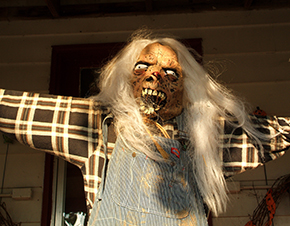 CONWAY, Ark. (June 5, 2013) – English professor Dr. Glenn
Jellenik likes to have class outside ... and talk about zombies.
CONWAY, Ark. (June 5, 2013) – English professor Dr. Glenn
Jellenik likes to have class outside ... and talk about zombies.
Jellenik taught Our Zombies, Ourselves for Maymester, an
intensive three-week summer program where students spend two and a half hours
every day on one course that might not be offered during regular semesters.
Maymester students earn class credit, focus with fewer
distractions, enjoy -special on-campus activities planned, and have an
opportunity to earn Odyssey credit. Other Maymester courses this year included
Digital Art, Cell Biology, Robotics Explorations Studio, Meaning Making in
Contemporary American Poetry, Calculus II, Presidential Decision-making in
Foreign Policy, and Sleeping and Dreaming, a psychology course.
Maymester’s time span and layout allows students to “really
dive deep into a subject and the depth of a topic,” said Jellenik.
The one course Maymester term allows students to focus on
one subject rather than prioritize one class over others during a 15-week term,
enabling students to push ideas further.
“Students make class fun when they can engage, and I can
just be another body listening,” said Jellenik.
Beginning with the 1932 film White Zombie and ending with the 2009 comedy Zombieland, Our Zombies, Ourselves examines zombie films through
the lens of American history (e.g. slavery, American imperialism,
post-colonialism, questions of race and gender, civil rights, economics,
post-9/11 apocalyptic visions) and film history (e.g. the Universal horror
boom, b-movies, the brief interstice between the collapse of the Production
Code and the installation of the MPAA ratings system, indie cinema, the digital
revolution).
The class studied Haitian history texts from writers like
Laurent DuBois and ethnographic work from Zora Neale Hurston. They also read
film scholarship from genre critics like Rick Altman and Thomas Schatz.
Jellenik, who also teaches at the University of Central Arkansas, came to Hendrix in fall 2012 with his wife Dr. Cathy Jellenik, who teaches French at Hendrix.
He originally conceived the zombie course while
teaching a course on horror at the University of South Carolina (USC).
Examining the horror genre, Jellenik realized he needed to focus on ultimately transforming a week of zombies in his horror class into a dedicated
course on zombies at USC.
But why the zombies?
Studying zombies is in fact “really fruitful,” said
Jellenik.
“There is such a low expectation. When you begin to take it
seriously, after you’ve dismissed it and then take a closer look, you see
there is something going on there,” he said.
Looking for the evolution and taking a pulse of the culture
which has produced it, intellectualizing, exploring fears, taking it all apart
critically and prompting questions just begins to graze the surface of
Jellenik’s zombie class.
Not a fan of horror or the zombie film? No problem.
“The skeptic—the one who hasn’t seen it or the one who
doesn’t really buy into all the horror—is the perfect viewer” said Jellenik,
“for they hold it accountable for what it should be accountable for.”
Founded in 1876, Hendrix College is a national leader in
engaged liberal arts and sciences education. For the fifth consecutive year,
Hendrix was named one of the country’s “Up and Coming” liberal arts colleges
by U.S. News and World Report. Hendrix is featured in the 2012 edition of
the Princeton Review as one of the country’s best 377 colleges, the latest
edition ofColleges That Change Lives: 40 Schools That Will Change the Way You
Think about Colleges,Forbes magazine's annual list of America's Top 650
Colleges, and the 2013 edition of the Fiske Guide to Colleges. Hendrix has
been affiliated with the United Methodist Church since 1884. For more
information, visit www.hendrix.edu.